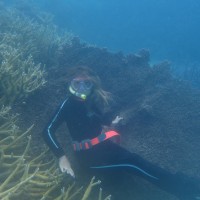Chiara Pisapia
PhD candidate
James Cook University

From 2005 to 2022, the main node of the ARC Centre of Excellence for Coral Reef Studies was headquartered at James Cook University in Townsville, Queensland (Australia)








ARC Centre of Excellence for Coral Reef Studies
Building 32, Room 108
James Cook University
Phone: +61 7 4781 6063
Email: chiara.pisapia@my.jcu.edu.au
Chiara is originally from Rome, Italy where she completed both her Undergraduate and Postgraduate degree in Marine Science. She always dreamed about doing research on coral reefs and after working in Indonesia she moved to Townsville in 2009 to start a Master of Applied Science in Marine Biology. In 2012 Chiara started her PhD in the ARC Centre of Excellence for Coral Reef Studies and AIMS@JCU, she is interested in understanding intraspecific variation in the ability of corals to withstand disturbances. Her PhD is entitled: Drivers of colony-level variation in condition and resilience for reef-building corals
Drivers of colony-level variation in conditions and resilience for reef-building corals
It is critical to better understand intra-specific variation in the ability of corals to withstand disturbances. Many studies have documented significant variation in the capacity of corals to withstand and recover from major disturbances, but the underlying basis of this variation is still poorly understood. This project will attempt to account for these differences in susceptibility, based on inherent and experimentally-induced variation in colony condition. Specifically the aim of this project is quantify background rates of partial mortality for coral populations at a hierarchy of spatial scales along the Great Barrier Reef. 2) To test influence of disturbance history versus other biological and environmental factors on colony condition. 3) To test both, the role of colony condition in determining capacity for tissue repair, and energetic consequences of tissue repair following experimentally induced partial mortality. 4) To explicitly test whether colony condition influence “resilience” (resistance and recovery) of corals to thermally-induced bleaching. Investigating drivers of colony-condition and their energetic consequences for colony resilience, provides a strong framework for predicting resistance, recovery capacity and resilience of reef-building corals.

Principal supervisor: Morgan Pratchett
Supervisory committee: Dr Hugh Sweatman
Pratchett M.S., Pisapia C., Sheppard C. 2013. Background mortality rates for recovering populations of Acropora cytherea in the Chagos Archipelago, central Indian Ocean. Marine Environmental Research 86: 29–34.
Pisapia C., Cole A.J., Pratchett M.S. 2012. Changing feeding preferences of butterflyfishes following coral bleaching. ISBN 978-0-9808572-5-2. Proceedings of the 12th International Coral Reef Symposium In: 12th International Coral Reef Symposium, 9-13 July 2012, Cairns, QLD, Australia.
Pisapia C., Hennige S.J., Haapkylä J., Matteucci R., Smith D.J. 2012. Morphological changes in polyp structure of massive coral species in clear and turbid waters. Bulletin of Marine Science 88(1):183–191.
Pisapia C., Pratchett MS. Spatial variation in background mortality of dominant coral taxa along Australia’s Great Barrier Reef. Fifteen minute talk. Australian Coral Reef Society Conference. Sydney, August 2013.
Pisapia C., Pratchett M.S. Changing feeding preferences of butterflyfishes following coral bleaching. Fifteen minute talk. 12th International Coral Reef Symposium, 9-13 July 2012, Cairns, QLD, Australia (15 min talk)
Pisapia C., Pratchett MS. Changing feeding preferences of butterflyfishes following coral bleaching. Student Conference AIMS (Australian Institute of Marine Science, Townsville QLD) June 2012
Pisapia C, Pratchett MS. Feeding preferences in butterflyfishes with coral bleaching. School of Marine and Tropical Biology, James Cook University School Conference. 2011
2013- ARC Centre of Excellence for Coral Reef Studies, Graduate Research Scheme (GRS).
2013- Student Travel Award to attend the 87th Annual Australian Coral Reef Society Conference (Sydney).
2012- AIMS@JCU project grant. Australian Institute for Marine Science, Townsville, QLD.
New DNA techniques are being used to understand how coral reacted to the end of the last ice age in order to better predict how they will cope with current changes to the climate. James Cook Univer
A new study on the effects of climate change in five tropical countries has found fisheries are in more trouble than agriculture, and poor people are in the most danger. Distinguished Profess
James Cook University researchers have found brightly coloured fish are becoming increasingly rare as coral declines, with the phenomenon likely to get worse in the future. Christopher Hemingson, a
Researchers working with stakeholders in the Great Barrier Reef region have come up with ideas on how groups responsible for looking after the reef can operate more effectively when the next bleaching
Abstract: As marine species adapt to climate change, their heat tolerance will likely be under strong selection. Individual variation in heat tolerance and its heritability underpin the potential fo
Abstract: The Reef Ecology Lab in KAUST’s Red Sea Research Center explores many aspects of movement ecology of marine organisms, ranging from adult migrations to intergenerational larval dispersal
Abstract: Macroalgal meadows are a prominent, yet often maligned component of the tropical seascape. Our work at Ningaloo reef in WA demonstrate that canopy forming macroalgae provide habitat for ad
Abstract: Sharks are generally perceived as strong and fearsome animals. With fossils dating back at least 420 million years, sharks are not only majestic top predators but they also outlived dinosa
Abstract: Connectivity plays a vital role in many ecosystems through its effects on fundamental ecological and evolutionary processes. Its consequences for populations and metapopulations have been
Abstract: Evolution of many eukaryotic organisms is affected by interactions with microbes. Microbial symbioses can ultimately reflect host’s diet, habitat range, and even body shape. However, how
Abstract: The past few years have seen unprecedented coral bleaching and mortality on the Great Barrier Reef (GBR) but the consequences of this on biodiversity are not yet known. This talk will expl